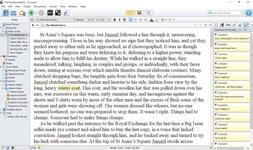I just realised the chapter I just wrote actually makes a chapter I cut made sense..
It's all about being brave enough, as @Robinne Weiss says to be prepared to throw away stuff (and being able to retrieve it, like Pam has just found). My last fantasy, I threw away 60,000 words five times, rewriting each time (and that is particularly hard for me. Throwing away the writing isn't daunting, it's having to rewrite and edit with only 3 left fingers, but I refuse to let that stop me).
I find Scrivener invaluable in so many ways. Anything I send to trash is always there (and that really helps with the confidence). I have my work separated in chapters or scenes, which I move around all the time to work out how my 2 POVs flow best, and the split screen means I can look at how one scene reads next to one another (which also helps me when developing characters to make sure their arcs flow). And I recently worked out how Scrivener integrates with Prowritingaid, so now I can edit for pacing.


